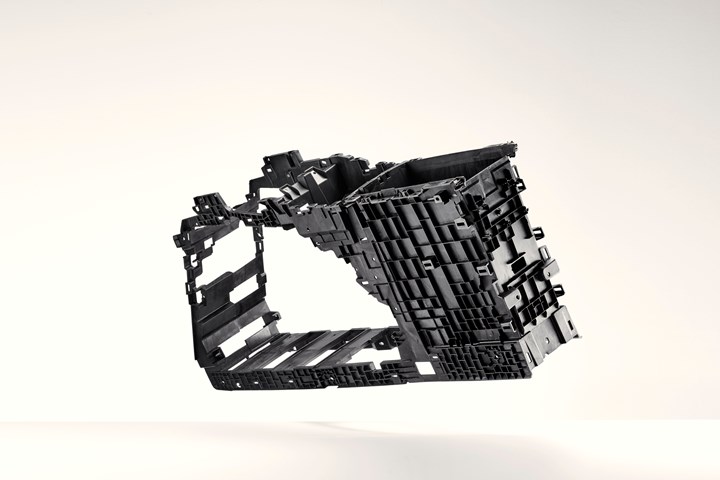Borealis highlights polypropylene technology for flexible automotive design
Fibremod, the customized carbon and glass fiber-reinforced polypropylene material ensures reduced weight, cost savings and design flexibility.

Center console automotive application using Fibremod. Photo Credit: Borealis
Borealis (Vienna, Austria), a supplier of polyolefin plastic materials for engineering applications in the automotive industry highlights the availability of Fibremod, its innovative carbon- and glass fiber-reinforced polypropylene (PP) technology, for the North American automotive market. The Fibremod family of customized products enables automotive manufacturers to achieve lighter weight and save on cost, says Borealis. Further, the company notes that replacing engineering plastics and metal parts with energy-efficient and lighter weight PP grades leads to improved fuel economy and lower CO2 emissions.
According to Borealis, products in the Fibremod family are a suitable material substitute for metal and engineered plastics, delivering unmatched design flexibility. Short-glass, long-glass and carbon fiber formulations are available, with customizable fiber content ratios, to enable manufacturers to balance strength, weight and cost according to specific design needs across applications ranging from front end and tailgate modules to instrument panel and center console carriers.
Fibremod products products also support energy efficiency in production by reducing process temperatures and energy requirements compared with alternative solutions such as polyamide (PA).
Related Content
-
The lessons behind OceanGate
Carbon fiber composites faced much criticism in the wake of the OceanGate submersible accident. CW’s publisher Jeff Sloan explains that it’s not that simple.
-
Plant tour: Albany Engineered Composites, Rochester, N.H., U.S.
Efficient, high-quality, well-controlled composites manufacturing at volume is the mantra for this 3D weaving specialist.
-
Cryo-compressed hydrogen, the best solution for storage and refueling stations?
Cryomotive’s CRYOGAS solution claims the highest storage density, lowest refueling cost and widest operating range without H2 losses while using one-fifth the carbon fiber required in compressed gas tanks.










.jpg;maxWidth=300;quality=90)


